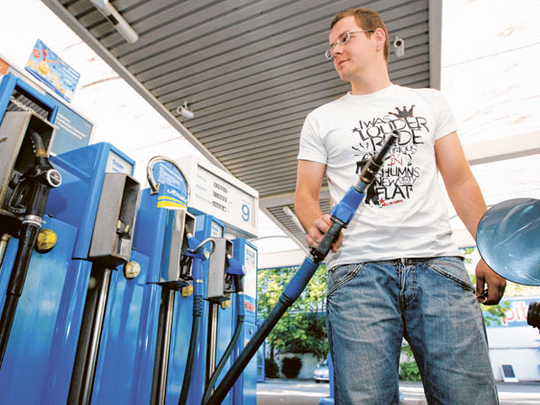
New York: American automobiles have a limited diet, but petrol's monopoly at the pump may be ending. The giant of US automakers is turning to something cheaper and cleaner: natural gas.
General Motors has announced plans to develop its first natural gas-powered engine, overcoming its long aversion to alternative fuels and joining a host of smaller players trying to do the same.
In Indianapolis, Marlon Kirby has built a new supercar that looks much like all the others — sleek, curvy, low to the ground — but which differs from its gas-guzzling counterparts in one major way: it runs on liquid natural gas.
After 21,000 man hours, the $1 million (Dh3.67 million) Maxximus LNG 2000 is ready for speed trials and Kirby expects it to top 200 miles per hour (322km/h).
GM and Kirby are at opposite ends of the same movement; to make car engines that use the country's abundant, cheap supplies of natural gas.
New technique
The US has more natural gas than it knows what to do with — up to 100 years of supply, experts say — thanks to a new drilling technique called hydraulic fracturing which releases huge reserves trapped in shale rock.
It is used mainly in electricity generation and for industry, but with just 120,000 natural gas vehicles on the road and only 900 filling stations, transport remains a tiny fraction of total demand.
However, assuming production forecasts are correct, natural gas will likely remain cheap for years and could help cut US reliance on oil. While crude prices soared above $110 a barrel this year due to unrest in the Middle East, US natural gas prices, impervious to international influence, remained low.
Drivers who fill up with natural gas at the pump saved up to $2 per gallon when petrol prices hit $4 a gallon. Carmakers, manufacturers and fleet owners are quietly scrambling to run their engines on the cleaner-burning fossil fuel which was formerly the preserve of trash trucks and city buses.
"With all the activity in shale gas, the natural gas price is decoupled from diesel. Natural gas is a lot more attractive given the situation in the market," said Ian Scott, president of Westport Innovations Light-Duty Division.
Westport, which develops technologies to convert engines to run on natural gas, is working with GM on the multi-million dollar project to develop a natural gas vehicle.
GM and Westport will look at light-weight engines, as small as 0.5 litres, opening up the market to smaller consumer vehicles previously overlooked by engine manufacturers. This would be only the second passenger vehicle in the US made at the factory to run on natural gas, following Honda's Civic GX.
Westport chief executive David Demers described this as the company's "breakout year". The company has sold 500 heavy-duty engine systems already, up from 25 the previous 12 months.
Separately, Mack Trucks has seen a 50-100 per cent rise in natural gas vehicle sales in recent years, mainly to refuse companies, said Curtis Dorwart, Mack Trucks' vocational marketing product manager.
"The big draw is the difference in the fuel price, especially with diesel above $4 a gallon," Dorwart said.
Oversupply
Interest in natural gas has waxed and waned over the years, generally in reverse proportion to the price of oil. What may be different now is the massive and long-term oversupply.
"Over the past five years, we have seen that when there is slump in oil prices a lot of people forget about transitioning to a domestic fuel," said Carla York, chief executive of Innovation Drive consultants in Virginia.
Mack Trucks was heavily involved in natural gas vehicles in the 1990s, with 400 or so on the road, but falling petrol prices dented demand enough that they were discontinued.
In the 1990s, GM offered the Chevrolet Kodiak and GMC Top Kick that were retrofitted to run on natural gas, but these were discontinued during restructuring in the mid-2000s.
Even if oil prices retreat again, some in the industry say natural gas will remain attractive due to its long-term abundance and the potential for government support. "The movement again towards natural gas is greater than in the late 1990s and this time it looks like it might have legs," said Curtis Dorwart, Mack Trucks' vocational marketing product manager.











